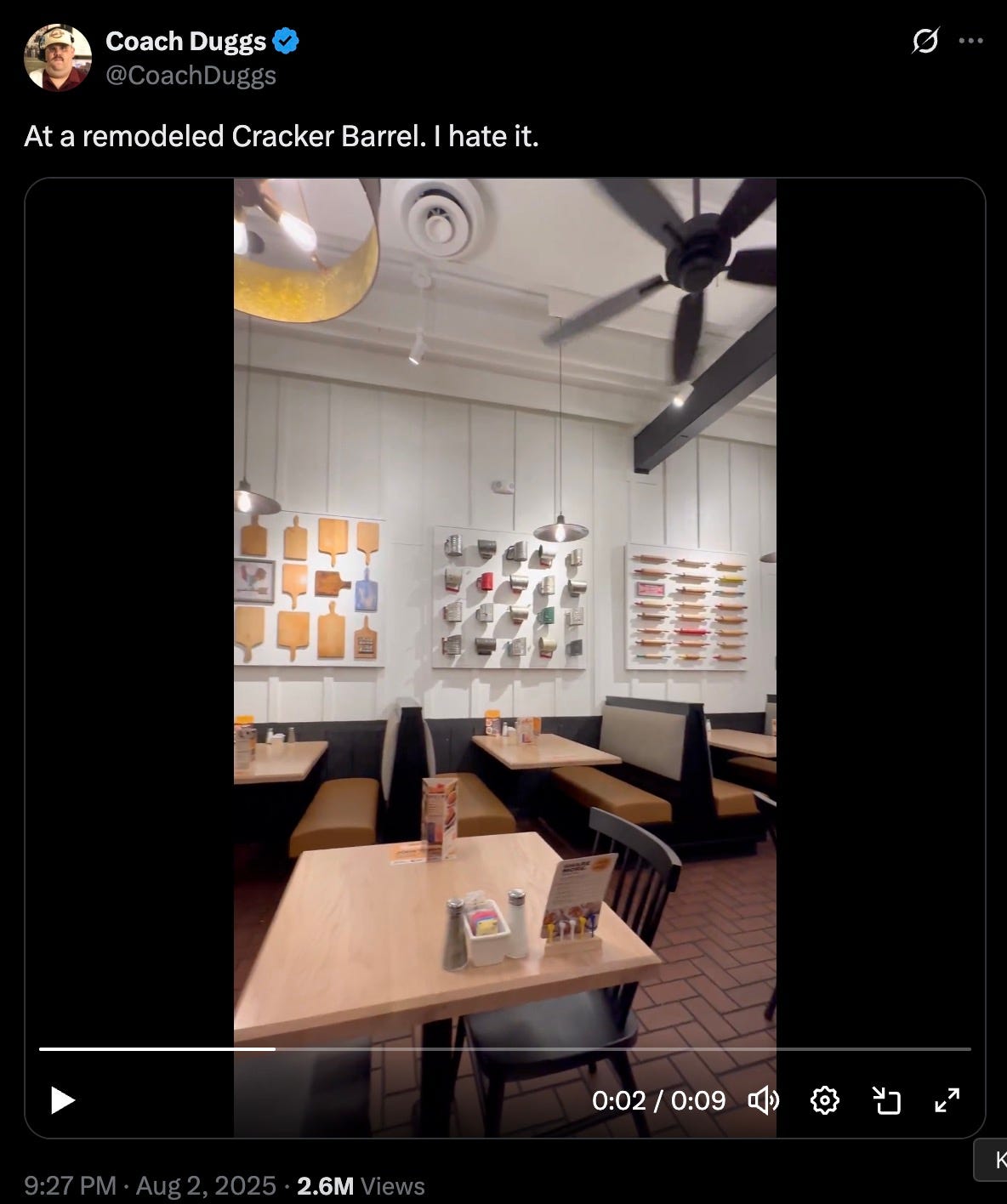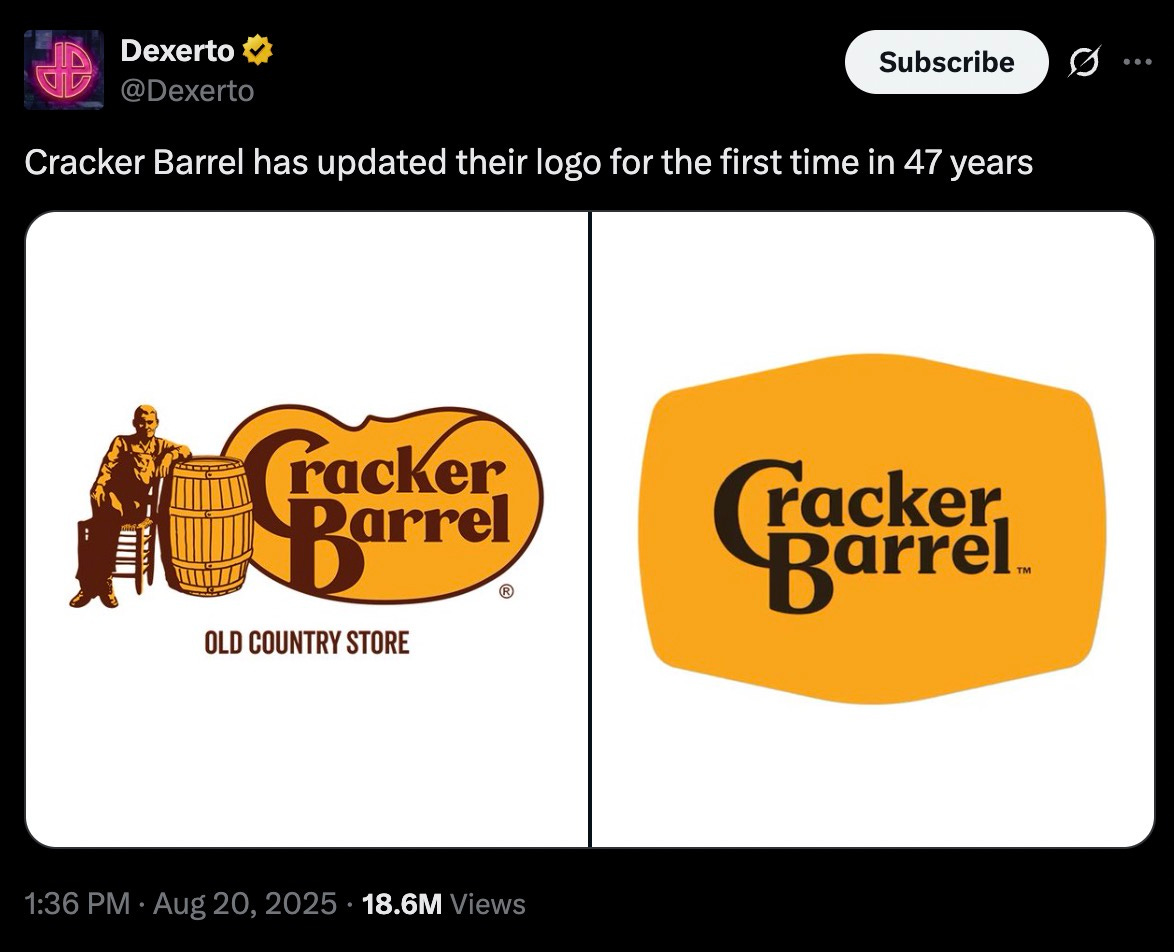The Cracker Barrel Cautionary Tale
Identity crisis
For decades, Cracker Barrel restaurants have been an Americana staple. With their somewhat kitschy yet welcoming country barn decor, they’ve traded on the South’s well-known reputation for having good food and warm hospitality.
Until now.
Thanks to flagging sales, the company announced a coming redesign. As you can see, it’s a complete overhaul of their beloved decor. They say that they’ve seen an early bump in revenue in the updated locations, though I suspect that’s largely driven by curiosity and a desire to be among the first to get a look at the changes.
It remains to be seen how the aesthetic change will affect the company, but I can’t imagine it’s going to be positive. The social media response has been overwhelmingly negative as the updates have trickled out slowly over the last year. People seem to think that trading the nostalgic trappings for a bland, overdone, “Magnolia-style” look is an abandonment of the chain’s soul, and I tend to agree.
At the heart of the issue, it feels like Cracker Barrel has abandoned what made them unique in an attempt to look like everybody else.
The funny thing is, I had written all the above a couple of weeks ago and stashed it in the drafts. Then, the company rolled out their new logo and baffled their clientele yet again. Take a look:
Talk about a downgrade.
These cosmetic disasters are just external manifestations of a company that has moved a long way from its roots in recent years, with the addition of alcohol to the menu in 2020 and a pro-LGBT “rainbow rocking chairs” stance shortly after. Getting back to offering good food and warm service was apparently too much to ask.
As they continue to decline, their search for a new identity is destroying them.
There’s a real lesson in there—for individuals, for churches, and really for any organization.
Chasing approval is the surest way to lose your identity.
“Becoming all things to all men” (1 Corinthians 9:22-23) can be twisted into making us doctrinal chameleons, trying to look like everyone around us. Yes, you have to meet people where they are. But that is much different than begging for their approval or abandoning your practices in hopes that they notice you.
For churches, this looks like being as loose on doctrine as you think you can get away with. Maybe if we make worship more entertaining… maybe if we lighten up on sin and preach feel-good messages… maybe if we divert all our efforts into letting everyone know how charitable we are… maybe if we let women get more involved… it’s a well-worn path, rife with examples.
When asked to explain all the changes being made to jazz up the worship experience, an elder at one of my childhood churches told my parents, “We feel we have to push the envelope to get people in the door.” Unsurprisingly, that congregation doesn’t exist anymore.
So much church growth “wisdom” from influencers like Andy Stanley subtly tells church leaders to figure out what people want and then give it to them. It might work for a while to get the numbers up (Stanley’s church is, indeed, huge). But it doesn’t produce lasting success.
Most of the big name megachurches decline after their superstar pastor moves on. The people weren’t there for God in the first place. When Jesus knew the crowd wasn’t there for the truth, He didn’t come up with programs to keep them happy. No, He turned them away (John 6).
So, instead of chasing people’s approval, maybe we should get back to asking God what He wants from us. As Jesus told us, it’s a curse when all men speak well of us (Luke 6:26). “Rebranding” our beliefs and practices to get their approval is not a path to God’s blessing.
To be clear, some kind of change still might be needed.
Keeping an identity doesn’t mean you have to do everything the same all the time. Cracker Barrel obviously needed to do something to reverse their declining sales.
In the same way, churches and people often need course corrections, too. The “If you can’t accept me the way I am” meme ideology keeps people from ever being honest with themselves and wondering what it is about them that needs improvement.
Relatedly, it’s easy for churches to get stuck thinking that how they’ve always done things is the only way God allows them to do it, and if people don’t want to show up to a Spring Gospel Meeting and a Fall Gospel Meeting, then I guess people just don’t want God anymore and we have nothing left to do but slide into oblivion. That, of course, is wrong.
Thankfully, just this year another restaurant gave us the blueprint for how to make positive change.
Steak’n’Shake has made headlines by switching out seed oils and corn syrup for beef tallow and cane sugar (two moves I highly endorse).
I couldn’t have asked for a more perfect example. They merely took what they already did and got better at it. They still serve French fries in a diner-style setting. The fries are now just healthier and tastier.
Church, we don’t need to change or water down the Gospel. We just need to get better at living it out.
This is the entire concept behind my book Church Reset (available here). More fellowship, deeper study, closer relationships, Acts 2 kind of family… THAT is the answer—not another flashy program or event.
And here’s the best part—sometimes getting better at what we’re supposed to do ALSO gets the attention of the people we want to reach. Beef tallow makes Steak’n’Shake’s fries better, but it also just so happens to speak to millions of us who have been desperate for a seed oil free dining option.
In the same way, a Biblical, tight-knit, accountable, challenging church is exactly what many people are craving and struggling to find. We change because it’s what God wants, but it works out pretty nice that what God wants is also what can win the lost.
But abandoning core principles in order to make somebody else happy is not the way to go. You just end up chasing approval from one person to the next until your identity is gone. Or, as a church, you end up selling out every doctrinal distinctive in the hopes that some outsiders will like “the new you.”
Nobody’s looking for a place with a minimalist new logo. They’re looking for a place where they’re going to find quality food. When the news cycle gives us a lesson this clear, we would be wise to take it.
Notes
Next Monday’s Think Deeper Podcast weaves the Cracker Barrel story and a number of other news items in to a discussion of church culture and identity. If you liked this article, I think you’ll really enjoy the episode. Click below for subscribe links to get the episode when it drops.
I am never one to give a high-pressure pitch for paid subscriptions on this site, but every bit of support means a lot. You can go here if you’d like to become a premium subscriber.





Excellent points. When will these woke CEO's learn? So frustrating!
That’s a shame…